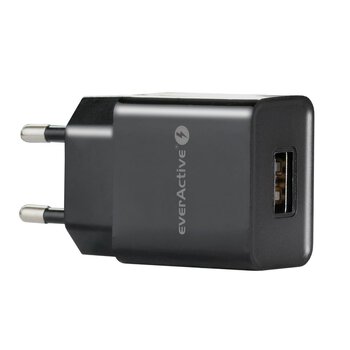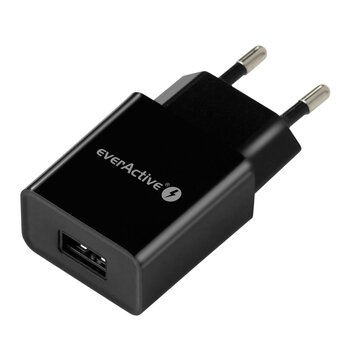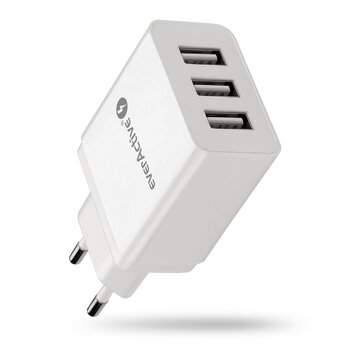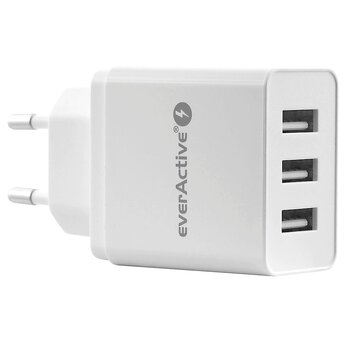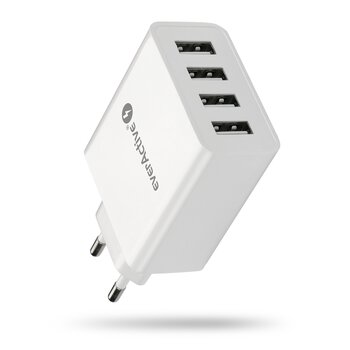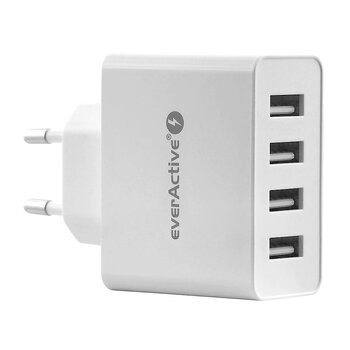- Tips
- technology
- Frequently Asked Questions
- Tests
- mAh capacity
- Rated Capacity
- comparison
- everActive
- Batteries vs rechargeable batteries
- Durability of rechargeable batteries
- Efficiency of rechargeable batteries
- battery voltage
- Accumulated energy
- LR03 AAA
- LR6 AA
- eneloop
- AG13 LR1154 LR44
- CR 2032
- Delta V
- Charge Cycles
- internal resistance
- charge level
- memory effect
- accredited test
- SR44 357
- Hearing Batteries 675
- SR626 377
- Watch Batteries
- Polarity
- Mah
- passivation
- LS 14250
- LS 14500
Slow or fast charging of your phone or smartwatch? What influence do we have on the charging speed (and life?) of the Li-ion battery in a smartphone, etc.?
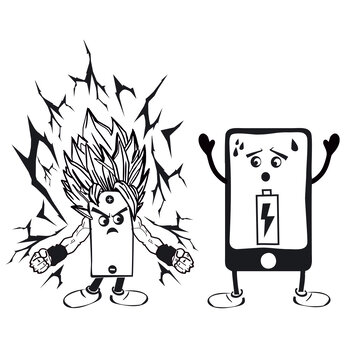
A large number of charging standards, standard chargers, slow chargers, fast chargers, Quick Charge, Power Delivery, PPS... You can certainly get lost in the current charging technologies of mobile devices, but it is worth knowing the basic principles of operation as well as the impact of the charger used on the performance of our equipment. We will divide the discussed topic into several scenarios along with typical questions and doubts of our customers. The article concerns a typical charging technique using a USB-A cable – the topic of wireless, inductive charging is governed by additional laws and restrictions, which may be the subject of another, future post on our blog.
1. My smartwatch requires a 5V 1A charger, while models with higher power and current capacity are popular on the market. I'm afraid that I'll burn my device with a 5V 3.4A charger.
Typical 5V USB chargers are nothing more than power supplies, which are a power source for the connected device. The most important aspect we should remember is that it is the device being connected that imposes its conditions on such a charger – in other words, it will want to draw a specific, predetermined amount of energy from the charger. The device designed for a 5V 500 mA USB charger will charge in exactly the same way and at the same speed, even if we connect it to a charger several times faster, more powerful. Also from the usability side, nothing prevents such a low-power device from being connected to a more powerful charger – but only under one condition – only if the output voltage of both chargers is identical – in the case of typical chargers with a basic USB output, the typical voltage is 5V DC.
2. So the new, universal 5V/5A charger will charge any less demanding device safely and optimally - even those requiring a maximum of 5V/0.5A?
A good quality, theoretically much more powerful USB charger will charge such devices in exactly the same way and just as quickly, as long as its output voltage (5V) is the same as the original charger.
There may be few exceptions to this rule, but they will only apply to uncertified and potentially dangerous devices, where the manufacturer has not taken care of the proper control of the charging process.
Using a weaker charger has only one potential advantage. A powerful charger operating under very low load conditions – of the order of 5% or 10% of its maximum capacity, will work with quite low efficiency – this means that slightly more energy drawn from the electricity grid will be wasted in the circuits of such a charger.
3. My phone has 80W super-fast charging - it charges the battery in less than half an hour. I'm worried about the battery life, especially since it's not easy to replace it.
In fact, almost all smartphones available today are equipped with solutions that speed up the charging of the built-in battery. Despite manufacturers' assurances that this does not affect the battery life, there are legitimate concerns that this treatment of the battery will negatively affect its durability. I will cite here the basic arguments supporting the above thesis. Higher charging currents mean higher temperatures for the components and the battery itself. As is well known, increased temperature is one of the main criteria that have a direct impact on the faster wear of batteries, rechargeable batteries and electronics in general. In addition, we must be aware that the ability to quickly accept and give off energy only has a sufficiently quality cell with low internal resistance. The increase in battery resistance associated with its natural wear and tear will cause the temperature to rise even more during charging, which in turn will cause it to wear out even faster. The charging power of such a battery will be significantly reduced at some point (safety mechanisms will kick in) and despite a similar charging time, the battery will already have a significantly limited usable capacity – there is no turning back from this and such a cell will only be suitable for replacement.
The most typical mechanism for accelerating charging involves using a voltage higher than 5V – e.g. 9V or 12V – in order to achieve such charging conditions, we need to have an appropriate, compatible charger that negotiates the charging conditions with our phone and sets the optimal (usually as fast as possible) charging rate. In a typical situation, we do not have much influence on the charging speed – if we want to "slow down" such a fast charger, a universal solution is to use a simpler, inferior quality cable that has only charging functions – without exchanging data – but in the era of USB Type-C powered devices, such cables are rarefishbone.
In such a situation, the only option is to use a different, standard charger that has a limited output voltage to standard 5V DC – e.g. everActive SC–100, SC–200, SC–300, SC–400 models. After connecting such a standard charger, the connected device should not negotiate a higher charging power than 10-12W, which is already a relatively low value for current batteries used in smartphones.
4. I bought a standard, but very powerful everActive SC–400 5V 5A USB charger, after all, it's still high current and as much as 25W of power – isn't it still too much for my devices?
As we wrote in point 1, it is not the charger, but the device that decides how much power it will draw from the charger. No popular smartphone will draw more than 2-2.4A from the standard 5V output of such a charger, even if the charger has more capabilities. In addition, the use of a longer cable or one with worse electrical parameters will further slow down the charging process.
5. I want to extend the battery life of my phone as much as possible, so I plan to buy a slow USB charger with a power of 5W 5V/1A.
Seemingly, this is not a bad idea – such a charger will not be able to give off significantly higher current, even if the device tries to force it, so we will actually limit the charging rate of the connected phone.
However, this has other possible consequences – a 5V/1A charger will work at a continuous overload limit when it powers a device that tries to draw 2A of current from it. The result will be an increased operating temperature of such a charger, and in extreme cases, its faster wear or even damage.
If the current efficiency of the charger used is lower than the actual requirements of our device, it may also cause other anomalies – including malfunction or disconnection of the connected device.
6. My smartwatch comes with a 5V/1A charger, in my opinion it's too much for such a tiny battery – is it worth looking for a 5V/0.5A charger?
As we described in point 1, such a smartwatch is designed for a specific charging rate and regardless of which charger we connect, the charging power will not be higher than that designed by the manufacturer. Whether it will be lower – not necessarily – a typical smartwatch, or a smartband usually does not draw more than 0.2-0.5A from a typical charger, regardless of whether it is a 0.5A, 1A or 3A charger.
Summary
If you really have concerns about the too fast charging rate of your phone, it is reasonable to buy a standard USB charger with a limited output voltage of 5V – such models are, for example, everActive SC–100, SC–200, SC–300, SC–400. A phone powered by such a standard charger will not charge at a power higher than 5-12W, regardless of the fast charging technology implemented by the manufacturer of our smartphone.
In the case of smartwatches or smartbands, the matter is even simpler, because these devices have a limited charging rate in advance and do not support sophisticated fast charging technologies themselves – here we can use virtually any USB charger, and the effect will be similar.
Remember, however, that the charger should not be weaker than the minimum requirements of our device – as we described in point 4 – the use of a charger with a lower current capacity may lead to its significant heating up and operation in suboptimal conditions for it and for the connected device. In the case of devices powered from the USB 5V port, however, nothing stands in the way of using a charger with a higher current capacity – the only negative consequence may be a slightly lower efficiency of the charger – according to point 2.
Copying the content of the article or its part without the consent of a representative of Baltrade sp. z o.o. is prohibited.
Recommended, standard 5V DC USB chargers available in our wholesaler:
iQ Smart Charging technology - built-in advanced chip automatically detects the connected device and charges it with the maximum current suitable for it
Network charger for phone / smartphone everActive SC-100B 1xUSB 1A
high performance - fast charging - up to 1A
output: 1 x DC 5V / 1A
total power output: 5W
Input Voltage: 100-240V~50/60Hz 500mA
robust, one-piece housing
IQ Smart Charging Technology-The built-in advanced chip automatically detects the connected device and charges it with the maximum current
AC charger everActive SC-300 3xUSB 3.4 A
High Performance -fast charging 3 devices at a time-up to 2.4 a per USB port
Output: 3 x DC 5V/2.4 A (3.4 a max.)
Total output power: 17W
Three wide-spread sockets-enable seamless connection of even thicker USB cables
iQ Smart Charging technology - built-in advanced chip automatically detects the connected device and charges it with the maximum current suitable for it
Network charger for phone / smartphone everActive SC-400 4xUSB 5A
high performance - fast charging of 4 devices at once - up to 2.4A for each USB port
output: 4 x DC 5V / 2.4A (5A max.)
total power output: 25W
four wide-spaced ports for seamless connection of even thicker USB cables
-
OK, to dlaczego w instrukcji producent zastrzega - "ładowarkę do 2 A
-
To pytanie do producenta urządzenia. Od strony technicznej zdanie w takiej formie nie ma uzasadnienia.
Wartość 2A to już dość wysokie natężenie bliskie maksymalnemu (2.4A) dopuszczalnemu z typowego, pojedynczego wyjścia USB 5V. Także trochę niezrozumiały jest taki zapis - takie ograniczenie jest w zasadzie nieskuteczne - praktycznie nie wyklucza zastosowania żadnej ładowarki.
Przy mniejszych wartościach - np. zapisie w instrukcji wartości 0,5A, czy 1,0A można się zastanawiać, co producent miał na myśli - albo dba o wysoką efektywności procesu ładowania - o tym wspominamy w artykule, albo boi się, że jeżeli w trakcie ładowania zawiedzie układ ładowania w jego urządzeniu to takie podłączone źródło zasilania zostanie zwarte - wówczas prąd zwarciowy 2,4A dla elektroniki jest na pewno bardziej destrukcyjny niż 1A - jednak to już wtórne następstwa już po wystąpieniu awarii w podłączonym urządzeniu. Subiektywnie takie zapisy oceniam jako dodatkowe zabezpieczenie producenta urządzenia, które może przy okazji świadczyć o wątpliwej jakości układu ładowania w samym urządzeniu.
-
